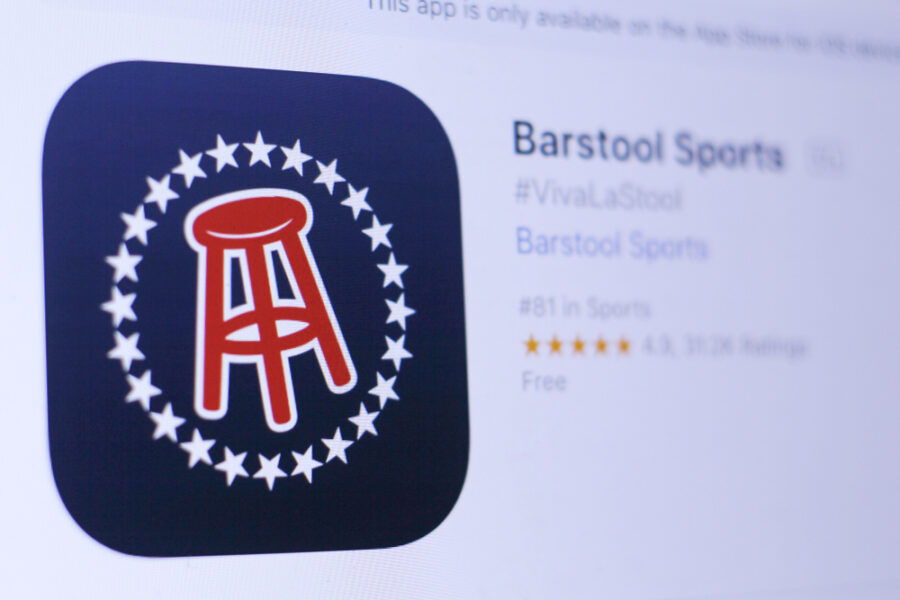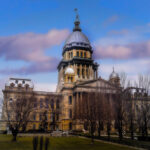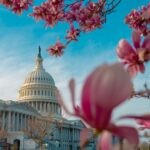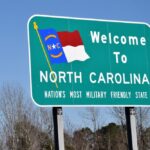Barstool influencers push anti-tax sports betting message during Pennsylvania budget talks

Pardon My Take podcast host Dan ‘Big Cat’ Katz, along with fellow Barstool Sports personalities Adam ‘Rone’ Ferrone and Max Dolente, have posted videos on social media platform X criticizing potential sports betting tax changes in Pennsylvania.
Speaking to his 1.8 million followers on the social media platform, Big Cat accused politicians of treating fans unfairly, while Rone added, “Every bet feels like we’re up against the opponent, spread, and Harrisburg’s hand in our pocket. We finally get legal gambling, something that we’ve wanted forever, and now they’re trying to tax it into the ground.”
The posts came ahead of Pennsylvania lawmakers gearing up to announce a budget plan for the state that is rumored to include increased taxes on gambling winnings.
The tax hike has not been officially disclosed. However, according to Spotlight PA, behind closed doors top Democratic leaders are pushing to raise levies on sports betting and igaming to generate funds for public transit.
Barstool also recently entered into a multi-year agreement with gambling operator DraftKings, which is active in the state.
This raised some questions around the ethics of the posts on X, as the media company is not registered to lobby in the state. DraftKings and its affiliates are registered, but have denied paying any of the Barstool employees for these posts.
DraftKings also came under scrutiny earlier in the week for leaving the American Gaming Association with sportsbook rival FanDuel, as both look to launch prediction markets in the coming weeks.
Charlotte Capewell brings her passion for storytelling and expertise in writing, researching, and the gambling industry to every article she writes. Her specialties include the US gambling industry, regulator legislation, igaming, and more.
Verticals:
Sectors:
Topics:
Dig Deeper
The Backstory
Why the tax fight erupted now
Pennsylvania’s budget talks collided with the country’s broader recalibration of how to tax sports wagering, setting the stage for a high-profile clash between influencer voices and policymakers. As state leaders weigh fresh levies to fund priorities like public transit, the industry has been jolted by a run of aggressive fiscal moves elsewhere that provide both a playbook and a warning. Just days before Harrisburg’s deliberations intensified, Illinois approved a new per-bet surcharge that piles onto last year’s steep operator tax hike, galvanizing operators and media allies to activate their audiences.
Illinois lawmakers, working up to a midnight deadline, approved a per-wager fee that charges 25 cents on the first 20 million bets and 50 cents thereafter, part of a broader push to raise $1 billion for transit in a $55.2 billion budget. The action followed the state’s jump of the online sportsbook tax rate to 40% last year. Industry pushback was immediate, with major operators and media partners warning of higher costs that could spill over to consumers or boost offshore sites. The Illinois package doubled as a test of political appetite for novel gambling levies and showed how quickly operators can mobilize fans when measures threaten margins.
That momentum carried into Pennsylvania, where whispers of tax increases on sports betting and igaming began to draw responses from personalities tied to sportsbooks. The growing use of social platforms to sway budget outcomes underscores how normalized sports betting has become in the entertainment ecosystem—and how contested the economics remain.
States search for revenue in a hot market
Statehouses are moving faster than federal authorities to tap the growth of legal betting, drawing on industry gains to ease budget pressure. North Carolina’s Senate Republicans recently proposed to double the state’s online betting tax rate to 36%, aligning the market with high-tax peers like New York and Pennsylvania. Leaders there say the plan could channel tens of millions to college athletics, while operators argue the hike risks dampening a sector that has already generated more than $135 million in taxes since going live in March 2024. The plan, which includes prescriptive college scheduling requirements and earmarked distributions to flagship and smaller campuses, shows how state policy is evolving beyond legalization to revenue engineering. Read more on the proposal’s design and political muscle in North Carolina’s budget push.
Illinois’ per-bet approach widens the menu of options available to other states. While traditional gross gaming revenue taxes target operator profits, per-wager fees directly tax handle, creating different incentives for pricing, promotions and risk management. Operators warn such fees are more likely to reach consumers in the form of thinner odds or reduced offers. After the Illinois vote, the industry’s trade coalition issued a sharp rebuke, signaling it would carry the fight to other jurisdictions contemplating similar moves. The backlash illustrates how a handful of high-profile tax measures can cascade across statehouses, shaping expectations—and tactics—elsewhere.
Influencers as policy actors
The deployment of sports media personalities into policy battles is no longer an edge case. A panel at SBC Summit Americas recently examined the line between entertainment and ethics as creators promote bets, noting the tension around long-shot parlays and the portrayal of bankrolls that may not match typical consumer experience. The discussion emphasized transparency, balance and the need to avoid glamorizing unrealistic outcomes. The debate, captured here in a conversation on regulating betting influencers, is gaining urgency as influencers comment on tax policy while maintaining commercial ties to operators.
This convergence creates new regulatory questions. When creators urge followers to pressure lawmakers on tax rates that directly affect their partners’ economics, it blurs the boundary between content and advocacy. Some states may examine whether existing lobbying disclosure rules or advertising standards extend to influencer-led campaigns, particularly when posts frame tax proposals as consumer harms rather than business costs. The industry has argued that higher taxes can push customers to illegal markets—concerns that resonate with policymakers but are difficult to quantify in real time. As more budget fights unfold, the norms for influencer participation—and potential guardrails—will be stress-tested.
Federal rumblings complicate the picture
Even as states iterate on wagering taxes, Washington is flirting with changes that could hit gamblers directly. A measure tucked into the latest federal budget package would cap the deductibility of gambling losses at 90%, a departure from current rules that allow winnings to be offset dollar for dollar up to the amount of losses. Industry advisers warn the 10% haircut effectively taxes break-even or losing players and could dampen high-volume activity. Lawmakers from gaming states signaled they are seeking fixes, but the episode shows how federal tax policy can upend behavior across casinos, sportsbooks and newer prediction platforms. For more on the proposal’s reach and industry reaction, see concerns over the federal budget bill.
The backdrop is a sector that has posted four consecutive record years of commercial revenue. The American Gaming Association reported $71.9 billion in 2024, driven by continued growth in online wagering and adjacent products. That top-line trajectory, detailed in the AGA’s summary of 2024 results, makes the industry an attractive target for tax writers. It also raises the stakes of policy missteps: higher headline rates or novel fees may lift near-term revenue but risk dulling competition or shifting activity to gray markets if margins tighten too far.
Legalization setbacks and a shifting map
While established markets debate rates, legalization drives in holdout states remain fragile. In Georgia, a key sponsor of online sports betting legislation resigned to pursue a business opportunity, injecting uncertainty into a push that relied on a 24% proposed revenue tax and a 2026 referendum. The change in leadership revives old questions about constitutional amendments and revenue allocation, which have derailed prior attempts. The timeline now depends on how quickly a replacement is named and whether remaining sponsors can marshal consensus. The latest twist is outlined in Georgia’s disrupted push.
These crosscurrents—rate hikes in mature states, experimentation with per-bet fees, influencers entering the fray, and uneven legalization—frame Pennsylvania’s deliberations. Operators are bracing for a patchwork of policies where the effective cost of doing business can swing widely across borders. States, meanwhile, are testing how much revenue the market can bear without driving bettors away or squeezing out smaller competitors.
What to watch next
The next phase will hinge on three questions. First, whether per-bet surcharges like Illinois’ spread, and if so, whether operators pass the cost through in pricing or product changes. Second, whether legislatures codify disclosure or conduct rules for influencer advocacy, particularly when creators have commercial ties to operators. Third, whether federal tax debates resurface, forcing a reassessment of player behavior and operator promotions nationwide.
For now, Pennsylvania sits at the center of a national test: can lawmakers capture more from a booming industry without undercutting the legal market’s appeal, and can the industry mobilize consumers without crossing lines that invite tougher regulation? The answers will shape not just budget math, but the balance of power between policymakers, platforms and the personalities that drive modern sports betting culture.








